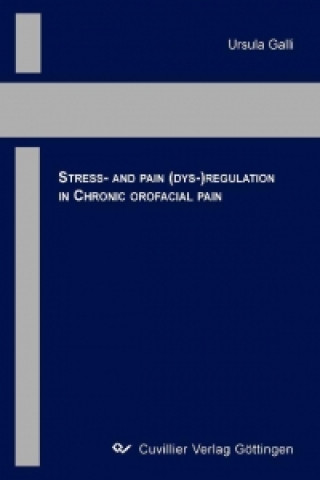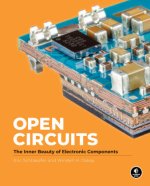
Kód: 12733153
Stress - and - Pain - (Dys)Regulation in Chronic Orofacial Pain
Autor Ursula Galli
The aim of this research was to examine patients with chronic orofacial pain with regard to two significant facets of stress and pain regulation ű on the one hand the neuroendocrinological system of the hypothalamic-pituitary-adr ... celý popis
- Jazyk:
 Angličtina
Angličtina - Vazba: Brožovaná
- ISBN-13: 9783867277808
Nakladatelství: Cuvillier Verlag, 2008
- Více informací o knize

Mohlo by se vám také líbit
Informovat o naskladnění knihy
Zadejte do formuláře e-mailovou adresu a jakmile knihu naskladníme, zašleme vám o tom zprávu. Pohlídáme vše za vás.
Více informací o knize Stress - and - Pain - (Dys)Regulation in Chronic Orofacial Pain
 Anotace knihy
Anotace knihy
The aim of this research was to examine patients with chronic orofacial pain with regard to two significant facets of stress and pain regulation ű on the one hand the neuroendocrinological system of the hypothalamic-pituitary-adrenal axis and on the other hand subjective illness beliefs, as measured by LeventhalĆs self-regulation model (SRM) (Leventhal et al., 1998). The significant effect of psychological and psychosocial factors on the chronicity of pain has been proved in numerous empirical studies and although stress has been investigated for some time as one of the most important psychosocial factors of chronic orofacial pain, there are hardly any studies that examine the underlying mechanisms of the hypothalamic-pituitary-adrenal axis. For this reason we conducted two studies at the interdisciplinary orofacial pain consultant service at the Center for Dental and Oral Medicine and Craniomaxillofacial Surgery of the University of Zurich. The first study investigated a possible dysregulation of the HPA axis by means of the ôlow-dose dexamethasone testö. Twenty patients (17 females, 3 males) with chronic myogenous facial pain were dentally examined according to the criteria for RDC/TMD. Further, each underwent a personal interview and completed a series of questionnaires (DIAX, HADS-D, Fatigue Scale, VAS Scales of pain intensity and quality of sleep). The control group comprised 20 healthy subjects, matched by gender, age and BMI. Salivary cortisol was measured on two consecutive days (awakening and daytime profile). 0,5 mg of dexamethasone was administered on the first evening. Results: in comparison to controls, chronic myogenous facial pain patients showed enhanced and prolonged suppression of cortisol following the administration of 0,5 mg of dexamethasone. Unstimulated cortisol response to awakening and daytime cortisol levels did not differ between the groups. Dysregulation in terms of enhanced negative feedback suppression exists in chronic myogenous facial pain. The second study investigated the predictive value of illness beliefs on therapy outcome in patients with chronic orofacial pain, as measured by the SRM. Relations could be found between subjective illness beliefs and physical as well as psychological adjustment in various chronic illnesses. No research is available to date with regard to chronic orofacial pain. 152 consecutive patients referred to the interdisciplinary orofacial pain consultant service at the Center for Dental and Oral Medicine and Cranio-maxillofacial Surgery, University of Zurich received questionnaires to assess pain and pain related disability, anxiety, depression as well as physical and mental quality of life at three time points: prior to treatment, three and six months after beginning of treatment. Results: Significant improvement over time was found for all outcome measures except mental quality of life. Results of the regression analysis indicated that believing pain could have serious consequences on oneĆs life (IPQ subscale consequences) is one of the most important predictors for treatment outcome regarding pain as well as mood in patients with chronic orofacial pain. The belief in low personal control and in a chronic timeline are shown to be predictive for outcome as well, explaining however a smaller proportion of variance. These results provided evidence that even when controlled for pain and mood, beliefs about pain are important predictors for treatment outcome and need to be considered in in the management of patients with chronic orofacial pain. Asking patients about their view of illness can provide essential information about these important predictors. Taken together both studies are in line with a multifactorial etiology of chronic facial pain, shifting the perspective away from a local towards a more central etiology with dysregulations in the stress and pain modulating system and pain related beliefs as important psychological determinants of adjustment to chronic pain.
 Parametry knihy
Parametry knihy
- Plný název: Stress - and - Pain - (Dys)Regulation in Chronic Orofacial Pain
- Autor: Ursula Galli
- Jazyk:
 Angličtina
Angličtina - Vazba: Brožovaná
- EAN: 9783867277808
- ISBN: 386727780X
- ID: 12733153
- Nakladatelství: Cuvillier Verlag
- Hmotnost: 152 g
- Rozměry: 208 × 144 × 10 mm
- Datum vydání: 27. October 2008
Oblíbené z jiného soudku
-

Dune
217 Kč -

Haunting Adeline
620 Kč -

Berserk Deluxe Volume 2
1092 Kč -

White Nights
90 Kč -

Powerless
291 Kč -

Atomic Habits
509 Kč -

Dune Messiah
228 Kč -

Berserk Deluxe Volume 3
1142 Kč -

One Day
218 Kč -

Berserk Deluxe Volume 1
1115 Kč -

Iron Flame
354 Kč -

Surrounded by Idiots
303 Kč -

Harry Potter and the Prisoner of Azkaban (Minalima Edition)
993 Kč -

Gravity Falls Journal 3
440 Kč -

Heaven Official's Blessing: Tian Guan Ci Fu (Novel) Vol. 1
440 Kč -

The Creative Act
550 Kč -

Dune
204 Kč -

Hunting Adeline
642 Kč -

A Little Life
267 Kč -

Children of Dune
230 Kč -

Heaven Official's Blessing: Tian Guan Ci Fu (Novel) Vol. 2
479 Kč -

Bungo Stray Dogs, Vol. 8 (light novel)
404 Kč -

Percy Jackson and the Olympians 5 Book Paperback Boxed Set
953 Kč -

Solo Leveling, Vol. 1
443 Kč -

The Prisoner's Throne
268 Kč -

Court of Thorns and Roses
268 Kč -

Cry Baby Coloring Book
281 Kč -

Fourth Wing
353 Kč -

Icebreaker
199 Kč -

Berserk Deluxe Volume 6
1089 Kč -

Avatar, the Last Airbender: The Kyoshi Novels (Box Set)
833 Kč -

The 48 Laws of Power
601 Kč -

House of Leaves
462 Kč -

Twisted Lies
213 Kč -

Dune Messiah
277 Kč -

No Longer Human
339 Kč -

48 Laws Of Power
503 Kč -

Twisted Games
291 Kč -

Caraval Paperback Boxed Set
905 Kč -

Solo Leveling, Vol. 2
351 Kč -

Open Circuits
910 Kč -

Berserk Deluxe Volume 5
1119 Kč -

Heaven Official's Blessing: Tian Guan Ci Fu (Novel) Vol. 3
410 Kč -

Berserk Deluxe Volume 4
1292 Kč -

Court of Mist and Fury
268 Kč -

SOLO LEVELING V08
436 Kč -

English File Upper Intermediate Multipack A (4th)
487 Kč -

CHAINSAW MAN V14
253 Kč -

Before the Coffee Gets Cold
251 Kč
Osobní odběr Praha, Brno a 12903 dalších
Copyright ©2008-24 nejlevnejsi-knihy.cz Všechna práva vyhrazenaSoukromíCookies




 Vrácení do měsíce
Vrácení do měsíce 571 999 099 (8-15.30h)
571 999 099 (8-15.30h)